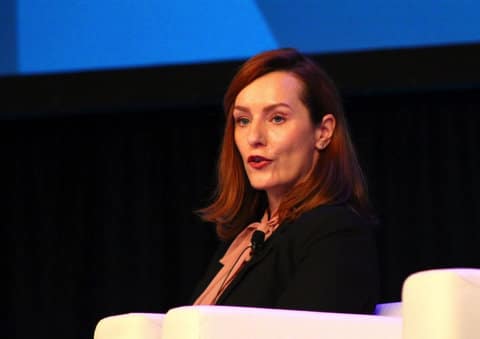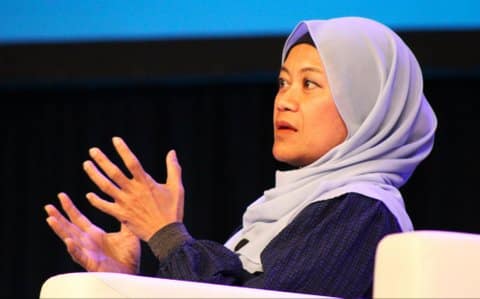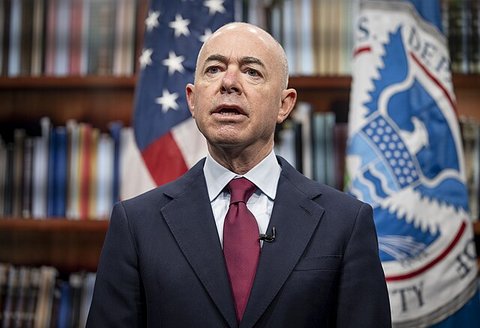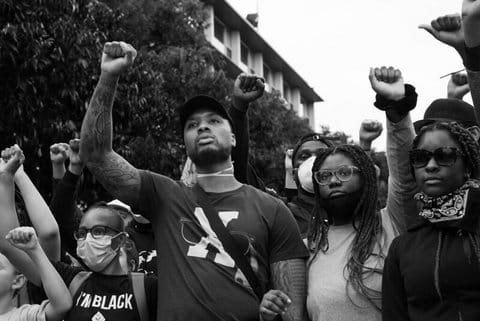
31 Mar State and Local Strategies Battling Bigotry Are Critical, Expert Says

Paula Granger, director of the New York State Department of Homeland Security and Emergency Services, speaks at the Eradicate Hate Global Summit in PIttsburgh about anti-hate methodologies in her state that can be implemented around the country. (Joe Porrello / The CC Pulse)
Editor’s note: The Eradicate Hate Global Summit began in 2021 in response to the mass shooting at the Tree of Life synagogue. Last year, The CC Pulse was there for the first time in service of our Stop the Hate coverage. This is one of many stories we will publish that is about or inspired by the summit.
By Joe Porrello
PITTSBURGH — Through judicial process, law enforcement and internet technology, three women are working to support victims of hate and combat radicalization at local and state levels.
Their effort comes at a time in which bigotry is rising at alarming rates. According to the Center for the Study of Hate and Extremism at Cal State San Bernardino, hate crime records over three decades old in Los Angeles, Chicago, Houston and San Diego were all surpassed in 2023, Axios reported in January.
Former U.S. appellate court judge Claire Williams; the director of the New York State division of the Department of Homeland Security’s Terrorism Prevention Unit, Paula Granger; and the co-founder of Moonshot — which battles hate and other harms online — Vidya Ramalingam, spoke together at the Eradicate Hate Global Summit about their efforts to fight hate.
Though retired from the court, Williams leads the Rule of Law pro bono project in Africa as part of her work providing counsel for the Jones Day law firm, which also focuses on immigration and constitutional policing and has a hate crime task force.
She also heads one of the working groups that work year-round and bring findings and ideas to the annual summit. Her cohort consists of judges, lawyers, academics and victims of bigotry who work on strategies to improve judicial processes in cases involving hate-fueled violence. Bringing past victims into the process will help current victims by supporting them emotionally and interpreting court language and logistics, she said.
Williams’ group as of last September was working on a judicial toolkit that would address all sides of a court case, and addressing the limits of free speech under the First Amendment. In particular, she drew a distinction between “that which is constitutional and that which spills over to incite violence, particularly to disrupt democracy.”
The help of survivors in combination with the toolkit will provide necessary aid to lawyers, according to Williams.
“There will be a need to train these lawyers so they know how to properly interact with victims,” she said.
>>>Read: They Lost Loved Ones to Violent Bigotry. Now, They’re Working to Stop the Hate
The working group brings together existing pro bono organizations — such as bar associations and law firms — to correctly address cases of hate, said Williams.
As CEO of Moonshot, Ramalingam creates technology and methodologies to pinpoint online threats and shield communities from hate.
She says national plans already in place to battle bigotry-based violence are a good start but not enough on their own.
“I think we all have recognized the critical importance of local solutions… especially if we are seeking to actually intervene,” said Ramalingam. “There’s evidence to show that no one is too far gone. If we stand a chance at stopping someone who might be considering violence, we need to find them and we need to connect them with the kinds of services that can work with people and deescalate them from violence — and that is most effectively done at state and local levels.”
States, indeed, are collaborating with members of the anti-hate field from many different sectors, including behavioral health, counselors, and practitioners networks.
“Delivering prevention at a state level doesn’t just require state governments to be willing to take that bold action,” Ramalingam said. “It involves all of us as a prevention community bringing together the various collective tools that we have and really trying to create a multidisciplinary model.”
And it must be done with care.
“How do we ensure interventions at the state level are delivered responsibly, legally, safely?” asked Ramalingam. “What are the minimum standards we’re willing to accept?”
Some of those standards were set in Buffalo, N.Y., after the racially motivated supermarket shooting in 2022. In response, New York Gov. Kathy Hochul signed an executive order that required every county in New York to develop a domestic terrorism prevention plan and submit it to the state homeland security department.
Granger said the shooting was the reason the department created its Threat Assessment and Management Team, which help counties gather their prevention plans and form groups of multidisciplinary stakeholders from their own communities “so they can start thinking about how they can identify early when there is a potential threat in the community and then what they can do about that threat to offramp a person from the pathway to violence.”
The executive order “also mandated the creation of a unit dedicated to preventing domestic terrorism,” said Granger, who helps manage the unit.
She said most violence steeped in hate is committed by people who display warning signs beforehand. Therefore, a public health-informed approach is beneficial.
>>>Read: Hate Is a Plague, One Physician Says
“Building out a prevention practitioners network across New York state really helps with getting people the help that they need, and it’s very specialized help that not everyone is well-equipped to do,” Granger said.
Part of that assistance is tailored to the internet sphere.
“Online spaces — which we all can recognize and all do recognize — are increasingly becoming a conduit for radicalization,” Granger said.
>>>Read: As Tech Turns to A.I. to Fight Hate, Experts Warn Human Input Is Critical
Enter Moonshot, which Granger pointed to as a key collaborator in the state’s relatively new and difficult fight against virtual bigotry.
“This is not easy stuff. We are hitting up against challenges every day,” said Ramalingam. “We’re not starting from scratch, but on the other hand, we do need to accept as a community that a lot of this is experimental. We’re trying new things, and it’s going to be hard.”
This resource is supported in whole or in part by funding provided by the State of California, administered by the California State Library in partnership with the California Department of Social Services and the California Commission on Asian and Pacific Islander American Affairs as part of the Stop the Hate program. To report a hate incident or hate crime and get support, go to CA vs Hate.






No Comments